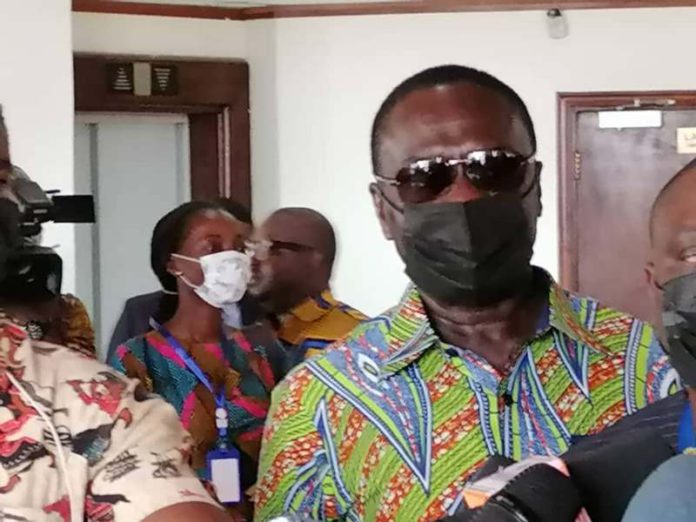A teacher at Yamoransa in the Mfantseman Municipality of the Central Region, Richard Takyi-Mensah, has testified against James Gyakye Quayson.
Mr Takyi-Mensah is the first witness called by the State as it seeks to prove five charges against the legislator including Perjury.
As part of his evidence-in-chief, the witness while being led by the Director of Public Prosecution, Mrs Yvonne Atakora Obuobisa, tendered in his witness statement after Tsatsu Tsikata had raised an objection.
The NDC MP is facing five charges of allegedly misleading the Electoral Commission to clear him to contest the 2020 Parliamentary elections.
He pleaded not guilty to all five charges namely deceit of Public officer, forgery of passport or travel certificates, knowingly making a false statutory declaration, perjury and false declaration for office.
He has pleaded not guilty to all five charges and granted GH¢100,000 bail with a surety to be justified.
Objection overruled
The objection raised by Tsatsu Tsikata, Counsel for the accused against the tendering of a witness statement by Mr Richard Takyi-Mensah, a teacher was overruled.
The Court, presided over by Justice Mary Maame Ekue Yanzuh, overruled the objection on grounds that, it was presumed that the witness had knowledge as said in the witness statement.
The court said, it could only be determined whether the witness had personal knowledge of the matter during cross-examination.
Tsatsu’s argument
Lawyer Tsatsu Tsikata, Counsel for the Accused while objecting to the tendering of the witness statement pointed out that, eight paragraphs should be expunged.
According to him, it was a basic feature of the legal process that witnesses could only testify to issues they had personal knowledge about.
Mr Tsikata further argued that, the witness does not have personal knowledge on the matters in paragraphs five to 13 in the witness statement which he sought to rely on.
It was also the case of Mr Tsikata, that, on July 29, 2019, the accused applied for a passport and Section 60 of the Evidence Act 1960 indicated that a witness may not testify on a matter unless significant evidence was introduced to support a finding that they had personal knowledge.
Counsel contended that nothing had been introduced in the witness statement that could support the finding and that, the witness statement had not said anything that indicated that the witness was speaking on behalf of the Passport Office.
He said in paragraphs 8 and 9, the witness had not made any information known to indicate that ha had personal knowledge about the accused person.
He said, the government of Canada was not represented by the witness and no bases had been laid to show that ha had personal knowledge of the matter.
DPP’s opposition
The Director of Public Prosecution (DPP) Mrs Yvonne Atakora Obuobisa, in response said the witness was a competent witness to testify in the matter.
According to the DPP, the witness had said he was the complainant or the petitioner, who reported the matter to the Director CID about the conduct of the accused person.
She added that, an investigation was conducted leading to the arrest of Mr Quayson, which resulted in him being charged with the offences.
The DPP said the petitioner in the witness statement raised issues as to the manner the accused obtained his Ghanaian passport.
Mrs Atakora-Obuobisa argued that, when it comes to whether the witness had knowledge of the matter, it was up to the defence to establish that through cross-examination.
According to the DPP, the matters raised from paragraphs 4 to 7; would be dealt with by the Director of Passport when the State brings him to tender documents in support of their case.
She said as a complainant in the case and under the Evidence Act, he had an opinion about things that have come to his knowledge.
She pointed to Section 118 of the Evidence Act, to say that, evidence is admissible even under the hearsay rule.
Justice Mary Maame Ekue Yanzuh after listening to the argument admitted the witness statement in evidence

